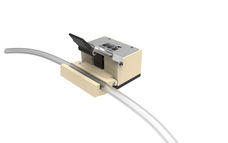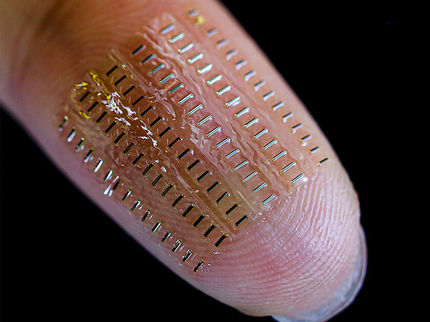Sniffing out cancer with improved 'electronic nose' sensors
Advertisement
Scientists have been exploring new ways to "smell" signs of cancer by analyzing what's in patients' breath. One team now reports new progress toward this goal. The researchers have developed a small array of flexible sensors, which accurately detect compounds in breath samples that are specific to ovarian cancer.
Diagnosing cancer today usually involves various imaging techniques, examining tissue samples under a microscope, or testing cells for proteins or genetic material. In search of safer and less invasive ways to tell if someone has cancer, scientists have recently started analyzing breath and defining specific profiles of compounds in breath samples. But translating these exhaled disease fingerprints into a meaningful diagnosis has required a large number of sensors, which makes them impractical for clinical use. Hossam Haick and colleagues sought to address this problem.
The researchers developed a small, breath-diagnostic array based on flexible gold-nanoparticle sensors for use in an "electronic nose." The system - tested on breath samples from 43 volunteers, 17 of whom had ovarian cancer - showed an accuracy rate of 82 percent. The researchers say developing this method further would require larger-scale clinical testing. They add that the approach could also apply to diagnostics for other diseases.
Original publication
Other news from the department science
These products might interest you

Hose pressure transducer by HiTec Zang
Contactless pressure measurement for sterile applications
Easy-to-install tubing pressure sensors for diameters from 4.8-19.1 mm

FireSting-PRO by PyroScience
New fiber optic measuring device: Precise measurements even in the smallest volumes
Measure pH, oxygen and temperature even under sterile conditions

Get the life science industry in your inbox
By submitting this form you agree that LUMITOS AG will send you the newsletter(s) selected above by email. Your data will not be passed on to third parties. Your data will be stored and processed in accordance with our data protection regulations. LUMITOS may contact you by email for the purpose of advertising or market and opinion surveys. You can revoke your consent at any time without giving reasons to LUMITOS AG, Ernst-Augustin-Str. 2, 12489 Berlin, Germany or by e-mail at revoke@lumitos.com with effect for the future. In addition, each email contains a link to unsubscribe from the corresponding newsletter.


























































